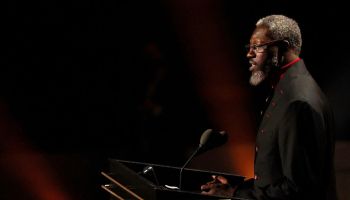Via: BlackAmericaWeb.com
Surely anyone thinking that a singular town hall would answer all the plaguing questions of race and its impact on not only the Obama presidency, but also the country’s future, would have been overly optimistic or simply delusional. But what “Obama’s America: 2010 and Beyond” illustrated in the waning hours of Martin Luther King Jr. Day is that while consensus is far from complete, the country is moving toward having more open dialogue about race and what its historic burdens mean for contemporary life.
“If we are going to have a society, we have to have a society of people who agree and disagree, a society of cultures, and these cultures should be proud of themselves and proud of each other,” said Tom Joyner, radio personality and BlackAmericaWeb.com founder. “That’s what makes this American community what it is. And we should strive for that.”
MSNBC’s Chris Matthews hosted the two-hour event, along with Joyner, at Texas Southern University in Houston. Before a live audience numbering in the thousands and a rotating panel who presented an array of views, Matthews tossed out questions and theories that engaged but rarely enraged presenters – though barbs were lobbed throughout the night.
“I’m not going to defend anybody,” Matthews said. “I’m here to listen to a large extent.”
And he did, as well as provoke. He got the ball rolling early by suggesting that the president’s response to Haiti demonstrated his leadership, contending that Obama came into his own by being decisive and corralling the support of the nation and its allies in a common humanitarian cause.
Joyner batted that ball back, replying that this wasn’t the first time Obama has reacted in a decisive manner, citing President Obama’s response to the “underwear bomber” – the would-be terrorist who nearly detonated a bomb aboard a flight headed to Detroit on Christmas Day.
“I think he acted quickly and passionately then,” Joyner said. “What did you expect? He’s not a superhero. What did you want him to do? Put out the fire [aboard the plane] himself?”
And that was just the opening.
In the time that ensued, Matthews posed questions, but took pains to mostly sit back and soak up the panel’s answers. He tossed topics ranging from the results of a new NBC/Wall Street Journal poll on race to the brouhaha surrounding U.S. Senate Majority Leader Harry Reid’s recently revealed references to then-U.S. Sen. Barack Obama to the ongoing debate over affirmative action.
The show was billed as a chance to explore whether Obama has delivered on the promise of helping America transcend its race-burdened past as both the first African-American president and one firmly entrenched in white and black cultures as a man of mixed heritage.
An audience seemingly hungry for new tools on thinking about and negotiating race listened closely, breaking into applause and participating in impromptu polling when Matthews threw questions its way.
Conclusions from the evening would be difficult to draw, but the myth of black monolithic thought was proven as just that. Several presenters pointed out that often the tangential trumps the substantial – with too many discussions about racial slights rather than policies that would ensure greater equality. Most agreed that the nation is far from “post-racial.”
But beyond those broad points, word-for-word agreement often was infrequent, and the night veered across a swath of arenas – more or less expected when tackling something as expansive as race.
Princeton University scholar Melissa Harris Lacewell mixed it up with both journalist Stephen A. Smith and author/scholar John H. McWhorter on whether focus should be on behavioral aspects of racial discrimination or institutional ones, such as segregation that can lead to inferior schools.
















